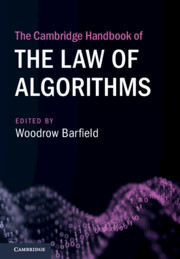Book contents
- The Cambridge Handbook of the Law of Algorithms
- The Cambridge Handbook of the Law of Algorithms
- Copyright page
- Contents
- Figures
- Tables
- Notes on Contributors
- Foreword
- Preface
- Acknowledgements
- Abbreviations
- Part I Introduction and Setting the Stage for a Law of Algorithms
- 1 An Introduction to Law and Algorithms
- 2 The Opinion of Machines
- 3 Private Accountability in an Age of Artificial Intelligence
- 4 Algorithmic Legitimacy
- 5 Understanding Transparency in Algorithmic Accountability
- Part II Business, Regulations, and Decision-Making with Algorithms
- Part III Intellectual Property and Algorithms
- Part IV Criminal Law, Tort Issues, and Algorithms
- Part V Constitutional Law, Human Rights, and Algorithms
- Part VI Applications and Future Directions of Law and Algorithms
- Index
4 - Algorithmic Legitimacy
from Part I - Introduction and Setting the Stage for a Law of Algorithms
Published online by Cambridge University Press: 19 October 2020
- The Cambridge Handbook of the Law of Algorithms
- The Cambridge Handbook of the Law of Algorithms
- Copyright page
- Contents
- Figures
- Tables
- Notes on Contributors
- Foreword
- Preface
- Acknowledgements
- Abbreviations
- Part I Introduction and Setting the Stage for a Law of Algorithms
- 1 An Introduction to Law and Algorithms
- 2 The Opinion of Machines
- 3 Private Accountability in an Age of Artificial Intelligence
- 4 Algorithmic Legitimacy
- 5 Understanding Transparency in Algorithmic Accountability
- Part II Business, Regulations, and Decision-Making with Algorithms
- Part III Intellectual Property and Algorithms
- Part IV Criminal Law, Tort Issues, and Algorithms
- Part V Constitutional Law, Human Rights, and Algorithms
- Part VI Applications and Future Directions of Law and Algorithms
- Index
Summary
The debate over algorithmic decision-making has focused primarily on two things: legal accountability and bias. Legal accountability seeks to leverage the institutions of law and compliance to put guard rails around the use of artificial intelligence (AI). This literature insists that if a state is going to use an algorithm to evaluate teachers or if a bank is going to use AI to make loan application decisions, both should do so transparently, in accordance with fair procedure, and be subject to interrogation. Algorithmic fairness seeks to highlight the ways in which AI discriminates on the basis of race, gender, and ethnicity, among other protected characteristics. This literature calls for making technologies that use AI, whether search engines or digital cameras, more inclusive by better training AI on diverse inputs and improving automated systems that have been shown to have a “disparate impact” on marginalized populations.
Information
- Type
- Chapter
- Information
- The Cambridge Handbook of the Law of Algorithms , pp. 107 - 120Publisher: Cambridge University PressPrint publication year: 2020
